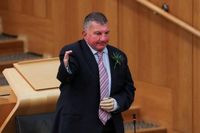Scottish politics was rocked on August 22, 2025, as Jeremy Balfour, a long-serving Conservative MSP for the Lothian region, announced his immediate resignation from the Scottish Conservative Party. Balfour, who has represented Lothian since 2016 and been a party member for over three decades, will now sit as an independent MSP until the next Holyrood election in May 2026. His decision, delivered in a pointed letter to party leader Russell Findlay and shared on social media, has exposed growing fissures within the Scottish Conservatives and raised questions about the party’s direction and future unity.
Balfour’s resignation letter, as reported by BBC Scotland News, did not mince words: “I fear that the Scottish Conservatives have fallen into the trap of reactionary politics, where a positive, proactive agenda for real change has been rejected in favour of allowing policies to be dictated by what other parties are saying and chasing cheap headlines.” He accused the party leadership of abandoning efforts to help Scotland’s most vulnerable communities and lambasted a lack of genuine policy innovation, particularly in the social justice and social security portfolios.
“I have found that there is little interest from the leadership in genuine policy innovation, particularly across the Social Justice and Social Security portfolio,” Balfour wrote, according to STV News. “Increasingly, decisions seem to be made by advisers who lack experience, while senior MSP colleagues are ignored.”
Balfour’s criticisms were not confined to policy direction. He expressed concern that the party’s approach to welfare reform amounted to “blind slashing of budgets,” which, he warned, would put those most in need at the highest risk. “We know that social security budget needs to be looked at, but the leadership has just taken the view of 'let's just cut benefits' without looking at what those benefits do, how they work, what effect that will have on employment, what effect it will have on individuals,” Balfour told BBC Radio's Good Morning Scotland. “It was a very easy headline to be grabbed, but the work below that has not been done and the work that I and others have done has just been ignored.”
His resignation comes on the heels of another high-profile departure. In April, Jamie Greene, MSP for West Scotland, left the Conservatives to join the Liberal Democrats, accusing his former party of becoming “Trump-esque in both style and substance.” Greene’s defection was followed by calls for other Tories to reconsider their positions, though Balfour is the first MSP to make such a move since then. The party has also suffered defections at the local council level, with several councillors switching allegiance to Reform UK, a party led by Nigel Farage that is polling strongly ahead of the 2026 Holyrood election.
Balfour’s letter conveyed a sense of personal loss and disappointment. “This is not a decision that I have taken lightly, nor is it one that I am happy to make,” he said, as quoted by The Scotsman. “I have been a member of the Scottish Conservatives since I was a young man, and the party has had a profound impact on my life, as a member, a councillor, and an MSP. However, I no longer feel that the Party has a positive platform to offer the people of Scotland.” He added, “I take no pleasure in leaving my political home after over three decades. But as I have watched the Party drift away from the principles that led me to join, I believe that I have no choice.”
Balfour also warned that the party’s current trajectory could have dire electoral consequences. “But unfortunately it might take some harsh electoral results to force the issue,” he wrote, suggesting that only a significant setback at the polls might prompt a reconsideration within the party.
His resignation highlights the ongoing internal strife following Russell Findlay’s ascension to party leadership in September 2024. Findlay, who inherited a party reeling from losing power at Westminster, has promised to wield a “claymore” against what he deems wasteful public spending and has prioritized tax and spending cuts as part of the Conservatives’ platform for the 2026 Holyrood election. Yet, as BBC Scotland News notes, these moves have not been universally embraced within the party, with some colleagues feeling sidelined and policy debates increasingly shaped by external pressures and media narratives rather than internal consensus or innovation.
Balfour’s critique extended to the party’s strategic focus, accusing the leadership of prioritizing rural areas at the expense of Scotland’s cities. He argued that this shift has left urban communities underserved and marginalized. “I fear that the Scottish Conservatives have fallen into the trap of reactionary politics, where a positive, proactive agenda for real change has been rejected in favour of allowing policies to be dictated by what other parties are saying and cheap headlines,” he reiterated.
Throughout his career, Balfour has been a vocal advocate for disability rights and social justice. Born with no left arm and a right arm that ends at the elbow, he has used his platform to champion the interests of disabled people and has often taken positions at odds with party leadership. Earlier this year, he opposed assisted dying legislation, citing concerns for disabled people and his Christian faith, according to BBC Scotland. Previously, he called for Boris Johnson’s resignation in 2022 following the "partygate" scandal, further demonstrating his willingness to break ranks when principle demanded.
Despite his departure from the Conservatives, Balfour has ruled out joining Reform UK and has yet to decide whether he will stand as an independent candidate in the 2026 election. He believes that some of his colleagues will be “sympathetic” to his decision, but he remains skeptical about the party’s current direction under Findlay. “It’s the Conservatives who have moved, not me,” he told BBC Radio. “I get on very well with Russell, I just think he has not quite yet grasped what the issues are and is willing to put forward a vision that is truly Conservative.”
Balfour’s resignation leaves the Scottish Conservatives with 29 MSPs in Holyrood. As the party braces for the 2026 election amid sagging poll numbers and challenges from both the political left and right, his departure underscores the risks of internal discord and the consequences of failing to unite around a clear, positive agenda. The Scottish Conservatives have been approached for comment, but as of publication, had not responded.
For now, Balfour says he will continue to represent his constituents in Lothian as an independent MSP, determined to uphold the values that led him into public service. Whether his departure will prompt reflection or further upheaval within the Scottish Conservatives remains to be seen, but the reverberations of his resignation are sure to be felt as the party navigates one of its most turbulent periods in recent memory.


